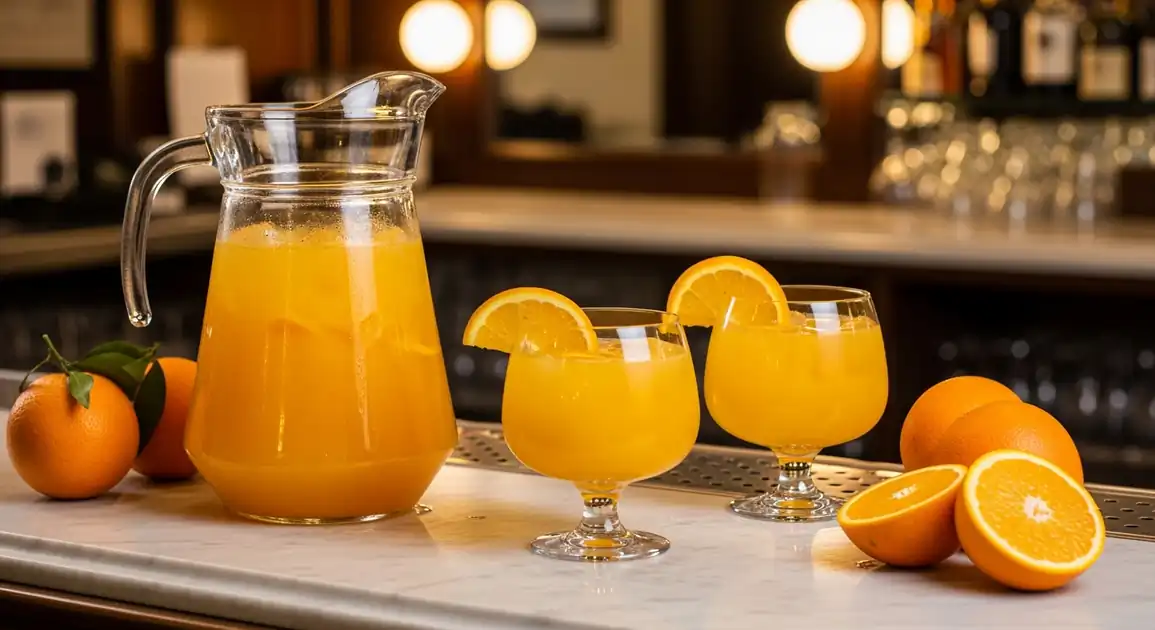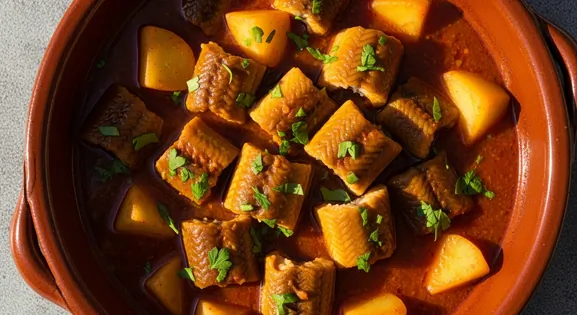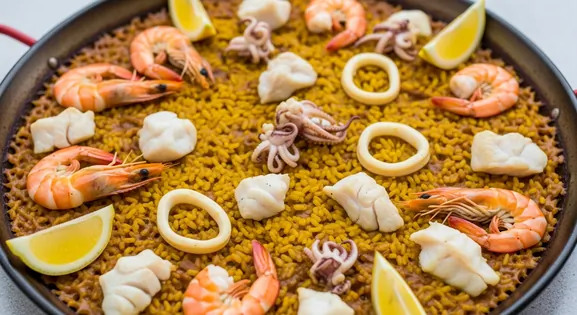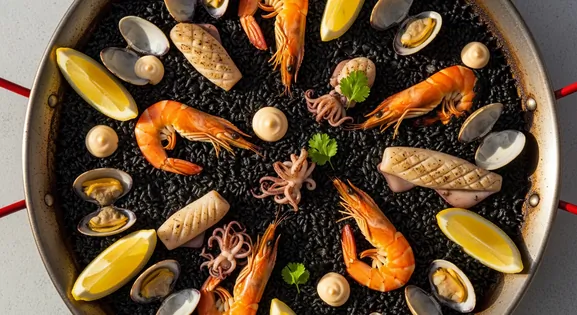Agua de Valencia (Valencian Water Cocktail) in Valencia
Agua de Valencia

A Beloved Local Dish
Stepping into a Valencian bar, you'll quickly notice the vibrant orange hue of Agua de Valencia. This iconic cocktail, born in the city, perfectly blends the region's famous oranges with Cava and spirits, offering a refreshing yet potent taste of local social life.
New to Agua de Valencia (Valencian Water Cocktail)? Learn all about its history in our complete guide.
Local Significance
Local Significance
Agua de Valencia is more than just a drink; it's a symbol of Valencian social life, hospitality, and local pride in its oranges and Cava.
Eating Customs
- Typically shared among friends from a pitcher.
- Sipped and enjoyed over conversation.
- Consumed year-round, regardless of the weather.
A Look at Local Preparations
House Recipes
While the core ingredients are consistent, nearly every bar has its own subtle tweak to the ratios or sweetness.
Cava vs. Champagne
While traditionally made with Cava, some establishments might offer a version with Champagne for a more luxurious, albeit less authentic, twist.
Insider Tips for Agua de Valencia (Valencian Water Cocktail)
While many places serve it, Cafe Madrid is often credited as the birthplace of Agua de Valencia. It's a historic spot to experience the original.
Agua de Valencia is perfect for the Valencian 'tardeo' – the late afternoon social gathering. Join locals for a pitcher before dinner.
Despite its refreshing taste, Agua de Valencia is strong. Pace yourself, especially if you're planning a long evening out in Valencia.
Where to Find Agua de Valencia (Valencian Water Cocktail) in Valencia
El Carmen
This historic old town district is a labyrinth of charming streets filled with traditional taverns and modern cocktail bars, many of which proudly serve their own take on Agua de Valencia.
Plaza de la Virgen, Plaza del Negrito, Calle Caballeros
Afternoon, Evening, Night
Ruzafa (Russafa)
This trendy and bohemian neighborhood is a hotspot for Valencia's vibrant nightlife, offering a wide array of stylish bars and cafes perfect for enjoying Agua de Valencia.
Mercado de Ruzafa area, Calle Cádiz
Afternoon, Evening, Night
Canovas
A sophisticated and bustling district, Canovas is renowned for its upscale bars and restaurants, making it an excellent choice for a more refined evening out with Agua de Valencia.
Plaza Cánovas del Castillo
Evening, Night
Near City of Arts and Sciences
The futuristic surroundings of the City of Arts and Sciences also host modern establishments, including chic bars and restaurants, where you can enjoy Agua de Valencia in a contemporary setting.
Shopping centers near CAC
Afternoon, Evening
Vendor Tips
- Always specify 'zumo natural' if you want to be absolutely sure about fresh juice.
- Ordering a 'jarra' is the most traditional way for groups.
- Many places have their 'secret' slight variations; try a few spots!
- Enjoy the social atmosphere often associated with sharing a pitcher.
A Traveler's Checklist
What to Look For
-
Bars explicitly stating they use 'zumo de naranja natural' (fresh orange juice)
Authentic Agua de Valencia relies on Valencia's famed fresh oranges. Prioritize bars advertising this.
-
Served in a chilled pitcher ('jarra') and glasses
Proper serving involves chilling both the pitcher and the glasses, common practice in reputable Valencia bars.
-
Mixed to order or in small, fresh batches
Observe if the bartender mixes it fresh or pours from a recently made batch, ensuring better quality and freshness in Valencia's bars.
What to avoid
-
Premixed versions in large dispensers or unknown containers
Avoid places where Agua de Valencia sits premixed for long periods, potentially using lower quality ingredients or compromising freshness.
-
Bars offering suspiciously cheap 'Agua de Valencia' deals
Extremely low prices in tourist areas of Valencia might indicate the use of artificial juice or cheap spirits. Quality ingredients cost more.
-
Consuming multiple pitchers without awareness of alcohol content
Its easy-drinking nature masks the potent mix of Cava, gin, and vodka. Pace yourself when enjoying it in Valencia's social settings.
What You Need to Know
Dietary Information
Important Note for Travelers: Your safety is our priority. Below are the common allergens associated with the traditional preparation of this dish. However, recipes and ingredients can vary significantly between establishments. Always confirm all ingredients directly with the food vendor before ordering, especially if you have a severe allergy.
Potential Allergens
Dietary Suitability
Price Guide
Budget Tips
- Price per glass ('copa') is usually €4-8.
- Pitchers ('jarras') for sharing cost around €15-25 and are more economical for groups.
- Prices might be slightly higher in prime tourist spots (e.g., near the Cathedral) than in local neighborhoods.
- Some bars offer it as part of a drinks deal.
Serving & Seasonality
Most commonly served by the pitcher ('jarra') for groups, but also available by the glass ('copa'). Served chilled in wide cocktail glasses, garnished with an orange slice.Best Times to Enjoy
- Afternoon ('Tardeo'): Popular during the late afternoon socialising period (approx. 5 PM - 8 PM).
- Evening / Night: A staple drink throughout the evening and night (from 7 PM onwards).
- Weekend Brunch/Aperitif: Sometimes enjoyed earlier on weekends.
Seasonal Availability
Available and popular year-round.
A Simple Guide to Ordering
To order like a local, ask for a "jarra" (pitcher) if you're with a group, as it's the traditional way to share. For a single serving, request a "copa" (glass). Specify "zumo natural" if you want fresh orange juice, though it's usually standard. Don't be afraid to ask for recommendations; many bars pride themselves on their unique recipe variations. Remember, it's a social drink, so enjoy it over conversation.
Getting the Most Out of Your Meal
How to Order Agua de Valencia Like a Local in Valencia
Master the art of ordering Valencia's signature cocktail, ensuring you get an authentic experience whether you're with friends or enjoying a solo glass.
- Visit a reputable bar or cafe in Valencia, especially those known for cocktails or with a traditional ambiance (e.g., in the El Carmen district or near the Central Market). Cafe Madrid de Valencia is historically significant.
- Ask the bartender if they make Agua de Valencia with 'zumo de naranja natural'.
- Order a 'jarra' (pitcher) to share, specifying the size if options exist (e.g., 'media jarra' for half, 'jarra de litro' for one liter). Or order a single 'copa' (glass).
- It's traditionally stirred gently before pouring into chilled, wide-mouthed cocktail glasses ('copas de cóctel').
- Sip and enjoy, but be mindful of its deceptively high alcohol content.
Recognizing Quality Agua de Valencia in Valencia
Learn to identify the signs of a well-made Agua de Valencia, from the freshness of its ingredients to its proper presentation in Valencian bars.
- Look for a vibrant, natural orange color, not dull or artificial.
- The drink should be served well-chilled, often with condensation on the pitcher and glasses.
- Observe if fresh orange slices are used as garnish, indicating attention to detail.
- A good balance of sweet, tart, and alcoholic notes should be present, without any single flavor overpowering the others.
Our Commitment to Quality
At Tasteplorers, our mission is to provide the most accurate and useful travel information in the world. To achieve this, all content on this site is created through our unique editorial framework. We utilize leading AI research tools, guided by our proprietary prompts, and a multi-stage validation process. This entire system is overseen by our editorial team to ensure everything we publish meets our high standards for accuracy, cultural nuance, and practical value for travelers.
Learn more about our Editorial Process and our Mission.
Countries
Explore regions
Europe
Discover Europe's diverse culinary landscape, from Mediterranean flavors to hearty Alpine fare. Learn to navigate markets, decode menus, and eat like a local.
Latin America & Caribbean
Discover the vibrant cuisines of Latin America & the Caribbean. Our expert guide covers everything from Mexican street food to Peruvian ceviche and market tips.
Oceania
Explore Oceania's diverse food scene. Learn about Polynesian earth ovens, Fijian feasts, and the vibrant café culture of Australia and New Zealand.
Southeast Asia
Explore Southeast Asia's diverse food cultures from Thailand to Vietnam. Get expert tips on navigating spice levels, choosing quality vendors, and understanding the rich traditions of the region.


